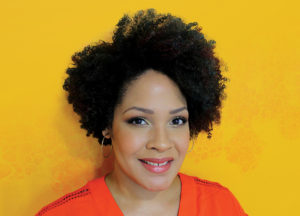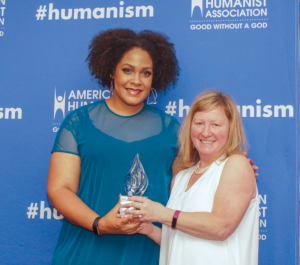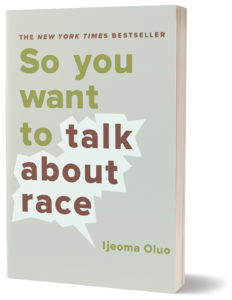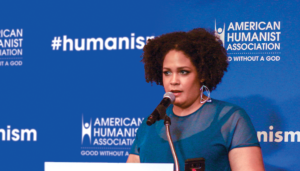Because I Want Us to Do Better

Ijeoma Oluo is a Seattle-based writer and speaker, focusing on feminism, race and identity, social justice, and economic issues for the Stranger, Medium, the Washington Post, the Guardian, TIME magazine, and other outlets. She also serves as editor-at-large for the online, female-run multimedia publication The Establishment and she’s the author of the New York Times Best Seller So You Want to Talk about Race, published in early 2018. On her decision to work as a freelance writer and publish largely online, Oluo said in a profile at Seattle Lesbian: “Especially as a Black woman it’s really important because you have to amass enough power in your own name to be able to say ‘no.’ Otherwise, your work is continuously shaped by other people.”
Oluo was named one of the Root’s 100 Most Influential African Americans in 2017 and one of the Most Influential People in Seattle by Seattle Magazine. In 2018 she was named the recipient of the American Humanist Association’s Humanist Feminist Award. The following is adapted from her May 19 acceptance speech at the AHA annual conference in Las Vegas, Nevada.
THANK YOU FOR RECOGNIZING MY WORK. Thank you for this award. You all invited me here and asked me to speak, so buckle up.
I’ve been a Black woman my whole life, and an atheist for almost all of it. I actually remember when I was about five and it was Easter. I asked my mom why we were celebrating and she explained the story of Easter and Jesus’s resurrection. I said, I don’t think that actually happened, and that was it. It’s not the most compelling story. It wasn’t incredibly painful. It was kind of settled.
My children have followed in my footsteps. We don’t talk about religion in our house. My brother is an atheist. My sister is, I believe. I don’t know—we’ve never even talked about it. My brother and I both have parented under the idea our kids would come to whatever they were going to come to. We’ve more or less tried to teach them to be considerate, kind, and compassionate people. We figured they would find their way and, hopefully, that would be enough.

AHA Director of Education Kristin Wintermute (right) presents the Feminist Humanist Award to Ijeoma Oluo (left ).
So this is just to say that atheism was never a thing I had to struggle with. Yet, when I received a letter notifying me that I had received [the AHA’s Feminist Humanist] award, I honestly thought I was being punked. Let me explain why. When people tell me that they’re humanists, it’s usually from this perspective: “I’m not a feminist, I’m a humanist.” This is often used to discount the work I do as a feminist or to say that I focus too much on identity politics and that we’re all one race. You know—“I’m not Black, I’m human.” (By the way, I’ve tried that with police officers. It doesn’t work.)
I’m not saying this because I think that all humanists are like the internet trolls who say these things to me every single day, multiple times a day. I’m saying this because I see a lot of concern in many humanist and atheist circles about what evangelicals are doing in the world—how we can stop them, how we can help them free themselves from dangerous impulses and dogma. But I need you to understand something: when I’m walking down the street as a Black woman, I am not watching out for evangelicals. When I’m shopping in the store and being followed, I am not thinking, I bet there’s an evangelical following me who’s going to accuse me of stealing. When I try to battle the anti-blackness that’s robbing our children of their education and their futures, I am not battling evangelicals. When I’m fighting for women’s rights to exist publicly and online and in business, I am not battling evangelicals. When I’m fighting the NIMBYs in Seattle where I live and trying to convince them that poor people, homeless people, addicted people, and people of color are actually people who deserve to stay in their communities, I am not trying to convince evangelicals. When I’m reminding people that weed legalization that doesn’t come with restoration or reparation for the countless Black and Brown people whose lives have been disproportionately ruined by the criminalization of drugs—it’s little more than a white supremacist scheme to profit off of an industry that still has my people in prison—I am not saying this to evangelicals.
“We live in a society where the privilege you have feels like the air you breathe.”
When Lolade Siyonbola’s freedom—and if you watch how cops treat Black people, her very life—was placed at risk because she dared fall asleep in her own dorm building at Yale, it was not an evangelical who put her at risk. It was a woman who wrote twice for the publication of the American Humanist Association.
When I looked at the mea culpa that this magazine put forth, I was dismayed but not surprised by some of the comments. People were asking how you could have known back then that the articles were racist. Indeed, making light of slavery, mocking and dehumanizing hijabis?! As a person of color, I would’ve seen at first glance that this was the type of person who might call the cops on a Black woman for daring to fall asleep in her own dorm. And when those articles were removed people asked, “Why are you silencing her? She said nothing wrong. Don’t humanists believe in free speech?” Like I said, I was dismayed but not surprised.
I’m not saying this because I want to ruin your dinner (even though I am famous for showing up and ruining everyone’s dinner). I’m saying this because I want us to do better.
I’m known for standing up in front of a room of people who think we’re on the same team and making them feel really shitty. It’s because I know they have the capacity to reflect and grow. When I listen to the people who’ve signed on to the values we say we hold, the values of equality and equity and justice, we should be doing better than we are. So this is where I choose to spend my time, in circles with people who already say they’ve signed on to show that it takes more than just saying you’ve signed on.
The great evils in our society may be enabled by religion, but they are not created by them and they are not cured by the absence of religion. There are many people in our circles who are seeing the rise of Black Lives Matter as a threat to their white supremacy and the rise of #MeToo as a threat to their role in the patriarchy. They don’t even understand that they’ve decided to take a stance against these movements. I’m seeing the strain in our circles from people who think we’ve pushed for too much equality, that we’ve been too divisive in deciding that the white male default is no longer acceptable and who are very threatened by the thought that they may not always be at the very center of their movements and may even prefer to burn it to the ground rather than reevaluate their roles in society.
“Where it has been easy for you to be a part of the system is where it will be easiest for you to change the system, but that requires really painful work. It requires being willing to see yourself as less great and more human.”
I’m saying this because I don’t think it’s why any of you signed on to humanism. I don’t think it’s why any of you are here. But it’s very intoxicating. We live in a society where the privilege you have feels like the air you breathe. The moment any of that is threatened, you feel like you’re suffocating while those of us who’ve never had enough clean air to breathe are just gasping for a simple breathe. What I need is for you to not always be looking for the harm others are doing but look for the harm you have done. Not to flog yourself, but because you will never be better than the people you decide to overlook. You will never be better than the compromises you decide to make. And you’re compromising human beings. You need to look for that.
 Where you have been a part of the problem is where you have the biggest opportunity for change. Where it has been easy for you to be a part of the system is where it will be easiest for you to change the system, but that requires really painful work. It requires being willing to see yourself as less great and more human. It requires you being willing to hold yourself and your community to account, but I need you to, because we’re all we have.
Where you have been a part of the problem is where you have the biggest opportunity for change. Where it has been easy for you to be a part of the system is where it will be easiest for you to change the system, but that requires really painful work. It requires being willing to see yourself as less great and more human. It requires you being willing to hold yourself and your community to account, but I need you to, because we’re all we have.
There are no strikes that we can make against evangelicals, against the religious right, against conservatives, if we’re going to be nothing more than oppressors in the end. I’ve seen the leaps that it takes to break free of a very Christian society. I was lucky it wasn’t hard for me. But I’ve heard tales from people who had to struggle against family, community, everything they’ve ever known. The other struggle you have to make is to break free from the patriarchy, to break free from white supremacy, to break free from trans-misogyny, to break free from ableism and classism.
Breaking free from dogma wasn’t necessarily about you convincing other people you needed to be free. It was about convincing yourself and finding where it had gotten into you and taken you away from your core self. You have to do that same investigation in everything you do as a humanist and as a human being. Look at your life and the systems you interact with day-to-day. Look at the groups you’re in. Look at the office space you occupy. Think, what part of this is easy for me that’s not easy for others? What can I do about that? Make it a little harder for yourself and a little harder for those like you to open up doors, to tear down walls if need be, so that we can get to true equity and true freedom in this society.
Q&A
 Question: First of all, I want to say thank you. How you approach all of us and hold us accountable for our actions is very moving and necessary.
Question: First of all, I want to say thank you. How you approach all of us and hold us accountable for our actions is very moving and necessary.
I see a lot of stories about cultural appropriation and racial insensitivity. A clothing company had a small African-American boy modeling a shirt saying “coolest monkey in the jungle.” I wasn’t sure how I should feel about that because I saw some comments saying that it was blown out of proportion and others saying that it was a very real issue that minimized African Americans’ history. I would like your opinion because I feel like I’m internally struggling with what’s too much.
Ijeoma Oluo: First, it’s really important to understand that it’s not about where the line is. It’s about where we are as a society. The issue with that t-shirt, which I believe was by H&M, or with any other issue of blatant racial insensitivity, isn’t necessarily about the intentions of the people who put it together. A lot of times we’re asking if they were trying to be mean, did they know what they were doing, or was it innocent–before we decide whether or not we’re going to support people who are harmed by it.
Racial trauma is a lifelong process. It’s intergenerational. It lasts hundreds of years. If you don’t face it every day, it’s hard to understand that every person of color comes to every new instance with their entire history of racial trauma. If you’re a Black person and this is the five-thousandth time you’ve seen Black people diminished in one way or another in pop culture, it’s not something where the intention actually matters at all. That marketing doesn’t happen in the room where any person of color works. That should be offensive to anyone whether you find the shirt offensive or not.
Second of all, if you ever have questions about the lived experiences of people of color, say, “You know what? I respect you as a human being and I respect your ability to interpret what’s happening in your life. What can I do to help?” That’s really how I hope everyone looks at these issues because cultural appropriation will pop up time and again, and the questions always tend to be: Can I wear this costume for Halloween? Is this too much? Was this comment bad? Instead we should ask about the power structure that makes this a problem and be offended by that, because it’s real and it’s harming people in far more ways than just a marketing campaign. I hope that helps.
Q: Do you often feel like people rely on you as something of a Google for minority issues? How do you navigate and deal with the fatigue of that?
IO: A woman came to me almost in tears, because her whole office had bought my book [So You Want to Talk about Race]. She’s the only woman of color in the office, and they were going to have a meeting about it. I said, you’re going to be the one who has to answer everything, aren’t you? I wish people understood the burden of that.
Think of how many people of color are directly in your life, how many trans people are directly in your life, how many disabled people are directly in your life, how many queer people are directly in your life. Do the math and understand this: nothing you ask is original or not Google-able. Think of how many times that person has been asked that question perhaps that week, and then think of the power structure you participate in. Realize they probably don’t feel free to answer you honestly or how much personal pain you’re asking them to delve into to answer your questions, and then think, should I research this first? Hopefully, the answer will be yes.
Asking people to walk you through how they can oppress you less is nothing more than further exploitation of your labor. You cannot be an ally while expecting to be able to exploit marginalized people on your way to enlightenment. We are not foot servants of wokeness. Set up your boundaries and feel confident in them. You decide who’s worth it and what’s worth it when you feel like it. Some days I don’t. Some days I post my fees. Some days I feel like having an in-depth heart-to-heart. I own that as a person who’s trying to survive and do whatever is best for me and my community. You don’t owe anything further than that.
Q: Can you give a couple of examples or a nutshell description of what it actually means to do the work as a privileged white person?
IO: It’s really important for people to understand the way that we look at systemic oppression. It is by design that we think of oppression and oppressors as people with evil intent who are out there trying their best, these megalomaniacal people who are rubbing their palms together and thinking of all the little people they are going to crush instead of just a functioning system. If we do nothing, it will benefit some and harm others.
I want people to understand that if you’re in a marginalized population, you’re trying to survive all of the time. I’m not saying it’s like I’m walking into a war zone 24/7, but I don’t have the luxury of being comfortable ever. The day before I accepted this award I was called “half nigger” walking down the Las Vegas strip. You just don’t know when it’s going to hit you. Now, if I am constantly afraid, constantly uneasy knowing that even at my moments of greatest joy something could hit me, then you really shouldn’t have a space as privileged people where you can feel comfortable.
Our children are four times more likely to be suspended from preschool, more likely to be suspended all the way up through high school, up to six times more likely to be arrested in school. And when they’re shot at the age of twelve for playing with a toy gun, the representative of the police can say that was no kid. Because something as simple as who gets to be a kid in our movies and our TV isn’t up to us. These things really matter. We have whole generations of people battling this messaging that says they’re not enough. If you had a multitude of films and books to choose from that told a story you could relate to, then wonder why we’re so upset when we can’t have a character in a film, or when something we create is appropriated. Start wondering what it would feel like to never see yourself.
Did you know that if you’re an indigenous person in this society, there is a good chance you will go your entire lifetime without ever seeing an indigenous actor starring in a major film? If you’re Asian-American, chances are you’ll see two. Yet, when we try to diversify film, people complain: “Is this a quota? Why can’t you just watch it? Why do you have to see color?” If you’ve always seen yourself, it’s easy to say that.
I’m always on the lookout for my personal privilege, and I become more privileged every year as my career progresses. I’ve had a tradition for years now where at the beginning of every year I write out all of the privilege I can find in my life. I make a list. I do this because then I can start looking for the areas where I’ve been a part of the problem and identify opportunities for change.
So when I talk about doing the work, I’m talking about some fairly simple things. Where do you spend your money? What entertainment and arts do you participate in? Are you speaking up when all of the management in your office are white or all-male? Are you attending school board meetings and asking about how they’re disciplining children of color or disabled children? Are you going to city council meetings and asking what their police reform efforts are? Are you even voting in city council elections? Are you having tough conversations in communities that feel like they can dismiss marginalized populations when none of them are in the room?
You do the work when you go to a restaurant that doesn’t have a ramp, and you walk up the stairs—it’s not a problem for you because you can walk up the stairs—and you ask to speak to the manager and you ask why they don’t have a ramp. When you get a letter home from your kid’s school saying that the PTA meeting is at noon, you ask, why isn’t this at a time when working parents, the majority of whom are going to be parents of color, can attend? Why isn’t this notice coming in multiple languages? That’s what doing the work looks like every day. You find what’s easy in your life, you think who it’s less easy for, and you think what you can do to fix it.
